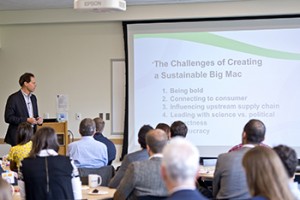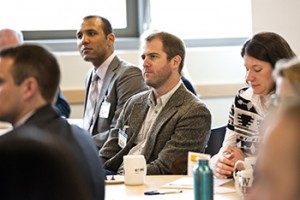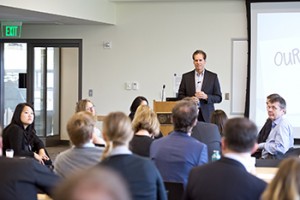Sustainable Big Macs: The plan for a leaner, greener McDonald’s
 Imagine going into a McDonald’s and learning that all of the beef used in their hamburgers was sustainably sourced. Not only that, but the restaurants were using less energy, recycling more and adding more fruits and vegetables to their menu. Seem far-fetched? Not when you learn that the company, famous for its fast, low-cost food items, has been developing sustainability initiatives for the past three years. Enter Bob Langert, McDonald’s Vice President of Corporate Social Responsibility and keynote speaker at Foster’s Fourth Annual Idea Lab. Speaking to an audience full of MBA students and Puget-sound area business leaders, Langert talked about supply chain, consumer buy-in, and championing sustainable beef at the home of the Big Mac.
Imagine going into a McDonald’s and learning that all of the beef used in their hamburgers was sustainably sourced. Not only that, but the restaurants were using less energy, recycling more and adding more fruits and vegetables to their menu. Seem far-fetched? Not when you learn that the company, famous for its fast, low-cost food items, has been developing sustainability initiatives for the past three years. Enter Bob Langert, McDonald’s Vice President of Corporate Social Responsibility and keynote speaker at Foster’s Fourth Annual Idea Lab. Speaking to an audience full of MBA students and Puget-sound area business leaders, Langert talked about supply chain, consumer buy-in, and championing sustainable beef at the home of the Big Mac.
Having labeled McDonald’s as a company in transition, Langert hopes that their involvement in the sustainability movement– which he thinks is “too small [and] too niche”– will jumpstart supplier and consumer buy-in. McDonald’s has developed a plan, dubbed “Our Journey Together. For Good”, to make their menu both healthier and sustainable. The plan’s goals include:
- To begin serving sustainably sourced beef by 2016
- Add more fruits and vegetables by 2020
- Reduce fat, sugar and overall calories in their food
- Provide 100 percent sustainably sourced coffee
- Reduce restaurant energy consumption by 20 percent
- Increase in-restaurant recycling by 50 percent.
To achieve these goals, McDonald’s first priority is to address the supply chain—which Langer believes accounts for 80 percent of the corporation’s environmental impact. While aggressive, this certainly isn’t the first time the Golden Arches has addressed food sourcing.
Dressed in chicken suits, Greenpeace activists staged protests in European McDonald’s restaurants with the hopes of raising awareness of deforestation in Brazil due to soya production in the Amazon. As it turned out, Amazonian soya was a major source of soy for McDonald’s food products. Surprising cynics (and probably a few Greenpeace protestors), Langert met with the activists, even traveling to the Amazon with them to get a first-hand picture of the devastation. Within three months, Langert says, McDonald’s was able to negotiate a moratorium on Amazon soya. Reflecting on the experience, Langert said, “[I’m] proud of the work, not proud that it came through a crisis.” The soya-based deforestation problem was a watershed moment for McDonald’s, driving the company’s other environmental initiatives like responsibly sourcing their coffee and their fish—100 percent of which comes from sustainable fisheries. With a focus now placed squarely on their beef suppliers, McDonald’s hopes to do the same for the millions of hamburgers they sell each day.
From enlisting the consulting expertise of famed animal science doctor and autistic activist Dr. Temple Grandin to honing in on their message, McDonald’s approach to the beef industry has been multi-pronged. Recalling his keynote speech at the first annual Ranch Sustainability Forum earlier this year, Langert reiterated the importance of coming together as a community to be more environmentally responsible and forward-thinking. “I kept saying we’re on the same page. We want sustainable beef to sell more beef.” However, Langert knows that sustainability isn’t limited to suppliers. Pointing to the trouble their European restaurants are having convincing their customers to recycle (crew members are manually separating garbage from recycling), Langert acknowledges there’s still a long way to go. When asked if it’s possible that customers are fatigued by sustainability messaging, Langert half agreed, stating that while McDonald’s Chief Brand Officer is coming up with “disruptive ways to reach consumers” he knows that what they’re doing right now is not enough. He added, “The plan right now is not consumer-centric. Our time now is being spent within the supply chain.” That’s not for nothing. Langert said that he continues to be astounded by the progress made on the supply side, stating that “suppliers discussing sustainability is a big deal.”
 There’s no doubt for Langert that McDonald’s has a challenging road ahead to achieve total supplier and consumer buy-in, stating, “When you try to develop something bold, there’s a lot of resistance.” However, Langert maintains that the folks at the Golden Arches are committed to taking sustainability beyond the “small and niche.” Within a few short years, McDonald’s may evolve in to paragon of environmental stewardship in the business world and possibly beyond. We’ll all just have to wait and see.
There’s no doubt for Langert that McDonald’s has a challenging road ahead to achieve total supplier and consumer buy-in, stating, “When you try to develop something bold, there’s a lot of resistance.” However, Langert maintains that the folks at the Golden Arches are committed to taking sustainability beyond the “small and niche.” Within a few short years, McDonald’s may evolve in to paragon of environmental stewardship in the business world and possibly beyond. We’ll all just have to wait and see.
This event was co-sponsored by Foster’s Net Impact MBA club. Net Impact is a new generation of leaders who use their careers to tackle the world’s toughest problems. They put their business skills to work for good throughout every sector. By doing so, they show the world that it’s possible to make a net impact that benefits not just the bottom line, but people and planet too. Learn more about the club here.
